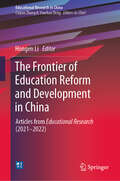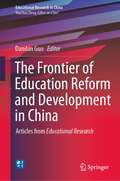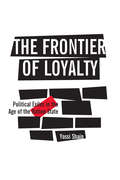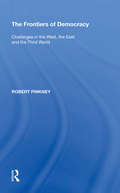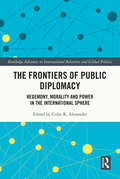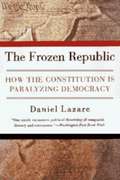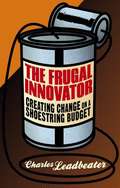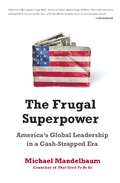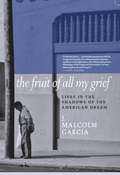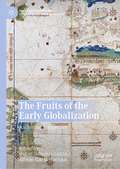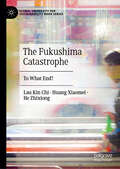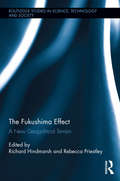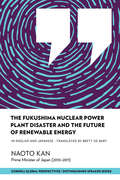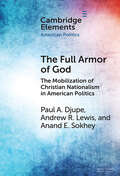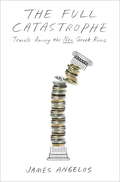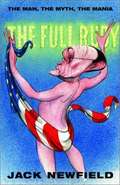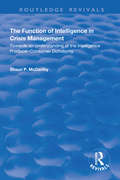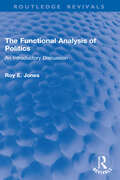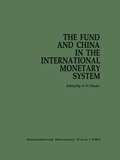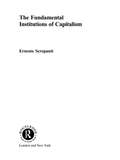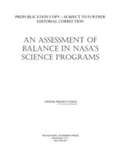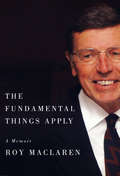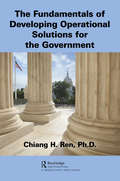- Table View
- List View
The Frontier of Education Reform and Development in China: Articles from Educational Research (2021-2022) (Educational Research in China)
by Hongen LiThis book is a collection of academic articles selected from papers published in the Chinese journal Educational Research in 2021–2022. Educational Research was first published in 1979 and is a national, comprehensive, and theoretical journal of education research. It is sponsored by the Ministry of Education of the People's Republic of China and the China National Academy of Educational Sciences (CNAES). This book presents 20 important educational research articles and covers topics such as educational policies, education technologies, teacher education, and moral education. This book showcases a curated selection of education research outcomes in China and aids readers in developing a comprehensive understanding of China's education reform and development.
The Frontier of Education Reform and Development in China: Articles from Educational Research (Educational Research in China)
by Dandan GuoThis book covers education theory and philosophy, basic education, education economy, management and other fields, focusing on the hot and frontier issues of Education reform and development in China 2020. The articles in this book has been translated from Educational Research—the top academic journal in the field of education research in China. It addresses the current issues and status of Chinese education, and pays a close attention on it. Educational researchers in the college and university, educational policymakers and frontline teaching staff would be interested in it. By focusing on the current hot issues and frontier education issues, we want to explore the deep theoretical basis behind the phenomenon, so as to establish in the reader’s mind the connections between theory and practice, China and world.
The Frontier of Loyalty
by Yossi ShainPaperback edition of the pathbreaking book on the role of exiles in international relations, with a new foreword (including material on the war in Iraq).
The Frontiers of Democracy: Challenges in the West, the East and the Third World
by Robert PinkneyFocusing in particular on the past decade, this enlightening volume explores the changing fortunes of democracy in the West, South East Asia and the Third World. It highlights the contrast between the expansion of democracy in quantitative terms, and the problems in maintaining or improving the quality of democracy. It examines such threats to democracy as public apathy, media trivialization, the power of big business and consumerism in the West, powerful states in South East Asia, and poverty and weak government in Africa, as well as the ubiquitous challenges of the global economy and the 'war on terrorism'. The author argues that a continued decline or stalling of democracy is not inevitable, but that it will require considerable human effort to claim or reclaim the political sphere.
The Frontiers of Public Diplomacy: Hegemony, Morality and Power in the International Sphere (Routledge Advances in International Relations and Global Politics)
by Colin AlexanderThis edited volume provides one of the most formidable critical inquiries into public diplomacy’s relationship with hegemony, morality and power. Wherein, the examination of public diplomacy’s ‘frontiers’ will aid scholars and students alike in their acquiring of greater critical understanding around the values and intentions that are at the crux of this area of statecraft. For the contributing authors to this edited volume, public diplomacy is not just a political communications term, it is also a moral term within which actors attempt to convey a sense of their own virtuosity and ‘goodness’ to international audiences. The book thereby provides fascinating insight into public diplomacy from the under-researched angle of moral philosophy and ethics, arguing that public diplomacy is one of the primary vehicles through which international actors engage in moral rhetoric to meet their power goals. The Frontiers of Public Diplomacy is a landmark book for scholars, students and practitioners of the subject. At a practical level, it provides a series of interesting case studies of public diplomacy in peripheral settings. However, at a conceptual level, it challenges the reader to consider more fully the assumptions that they may make about public diplomacy and its role within the international system.
The Frozen Republic: How the Constitution Is Paralyzing Democracy, 1st Edition
by Daniel LazareIn this thought-provoking book, Daniel Lazare blames America's outmoded constitutional system of checks and balances for the political malaise and governmental gridlock of recent years. He is giving a call for rethinking on constitution.
The Frugal Innovator
by Charles LeadbeaterThis insightful book looks at the phenomenon of low-cost innovation and explores what we can learn from the innovators in developing nations who are making amazing technical and social advances with scarce capital and resources. Charles Leadbeater shows how these methods can be applied and used wherever you are and whatever your capital.
The Frugal Superpower: America's Global Leadership in a Cash-Strapped Era
by Michael MandelbaumWhich of AmericaOCOs essential international commitments can we afford to keep in this time of diminished financial resources?
The Fruit of All My Grief: Lives in the Shadows of the American Dream
by J. Malcolm GarciaThey go by a lot of different names—civilians, unintended victims, innocent bystanders—but no matter what they are called their stories are most frequently left untold. From the families scraping by in New Orleans after Hurricane Katrina, to the prisoner sentenced to life for transporting drugs to save his son’s life, to the soldier who served his country only to be deported, the people whose stories are told in this book all lead rich and multifaceted lives of struggle, the telling of which honors them—and us. The Fruit of All My Grief returns us to the universal themes of endurance, struggle, survival, and the injustices of mammoth institutions and public indifference. J. Malcolm Garcia’s soaring narratives amount to an updated portrait of lives lived in the shadows of the American dream—not in the Great Depression years or in the McCarthy era but very much now in the closing year of the second decade of the twenty-first century.
The Fruit of Liberty
by Nicholas Scott BakerIn the middle decades of the sixteenth century, the republican city-state of Florence--birthplace of the Renaissance--failed. In its place the Medici family created a principality, becoming first dukes of Florence and then grand dukes of Tuscany. The Fruit of Liberty examines how this transition occurred from the perspective of the Florentine patricians who had dominated and controlled the republic. The book analyzes the long, slow social and cultural transformations that predated, accompanied, and facilitated the institutional shift from republic to principality, from citizen to subject. More than a chronological narrative, this analysis covers a wide range of contributing factors to this transition, from attitudes toward officeholding, clothing, the patronage of artists and architects to notions of self, family, and gender. Using a wide variety of sources including private letters, diaries, and art works, Nicholas Baker explores how the language, images, and values of the republic were reconceptualized to aid the shift from citizen to subject. He argues that the creation of Medici principality did not occur by a radical break with the past but with the adoption and adaptation of the political culture of Renaissance republicanism.
The Fruits of Freedom in British Togoland
by Kate SkinnerThe end of World War I saw the former German protectorate of Togoland split into British- and French-administered territories. By the 1950s a political movement led by the Ewe ethnic group called for the unification of British and French Togoland into an independent multiethnic state. Despite the efforts of the Ewe, the United Nations trust territory of British Togoland was ultimately merged with the Gold Coast to become Ghana, the first independent nation in sub-Saharan Africa; French Togoland later declared independence as the nation of Togo. Based on interviews with former political activists and their families, access to private papers, and a collection of oral and written propaganda, this book examines the history and politics behind the failed project of Togoland unification. Kate Skinner challenges the marginalization of the Togoland question from popular and academic analyses of postcolonial politics and explores present-day ramifications of the contingencies of decolonization.
The Fruits of the Early Globalization: An Iberian Perspective (Palgrave Studies in Comparative Global History)
by Rafael Dobado-González Alfredo García-HiernauxThis book presents an unusual view on one of the most influential periods in world economic history: the Early Globalization. By this term, the notion that a process of genuine globalization took place in the Early Modern Era is defended. The authors propose that the canonical globalization—that of the nineteenth and early twentieth centuries—was preceded by a century-long increasing economic integration between continents that were non-existent before 1492. The economic aspects of the Early Globalization, like market integration, price co-movements and international silver circulation, were very important. Notwithstanding, other dimensions of human life, which were affected by unprecedented intercontinental contacts, including free and forced migrations, changes in tastes and consumption, etc. The Fruits of Globalisation deals with some of the most important issues among the former and the latter. The book combines approaches from different disciplines, including quantitative and non-quantitative economic history, econometrics, international trade and demography. Overall, the vision of the Early Globalisation offered in this book is less pessimistic than in mainstream literature on the period.
The Fukushima Catastrophe: To What End? (Global University for Sustainability Book Series)
by Kin Chi Lau Huang Xiaomei He ZhixiongBased on a variety of interviews with residents, farmers, scientists, journalists, and activists who have been affected by the Fukushima catastrophe, the authors underscore the personal, political, and humanitarian impacts in testimonies, science, and photos. The book engagingly addresses diverse issues that continue to haunt and persist and calls for collective responsibility to deal with the devastating environmental, economic, and social consequences of nuclear energy. The book offers a critique of the violent history of modernism and the supremacy of science that has been articulated into all forms of social injustice and ecological injustice.
The Fukushima Effect: A New Geopolitical Terrain (Routledge Studies in Science, Technology and Society)
by Richard Hindmarsh Rebecca PriestleyThe Fukushima Effect offers a range of scholarly perspectives on the international effect of the Fukushima Daiichi nuclear meltdown four years out from the disaster. Grounded in the field of science, technology and society (STS) studies, a leading cast of international scholars from the Asia-Pacific, Europe, and the United States examine the extent and scope of the Fukushima effect. The authors each focus on one country or group of countries, and pay particular attention to national histories, debates and policy responses on nuclear power development covering such topics as safety of nuclear energy, radiation risk, nuclear waste management, development of nuclear energy, anti-nuclear protest movements, nuclear power representations, and media representations of the effect. The countries featured include well established ‘nuclear nations’, emergent nuclear nations and non-nuclear nations to offer a range of contrasting perspectives. This volume will add significantly to the ongoing international debate on the Fukushima disaster and will interest academics, policy-makers, energy pundits, public interest organizations, citizens and students engaged variously with the Fukushima disaster itself, disaster management, political science, environmental/energy policy and risk, public health, sociology, public participation, civil society activism, new media, sustainability, and technology governance.
The Fukushima Nuclear Power Plant Disaster and the Future of Renewable Energy (Distinguished Speakers Series)
by Naoto KanIn a speech delivered in Japanese at Cornell University, Naoto Kan describes the harrowing days after a cataclysmic earthquake and tsunami led to the meltdown of three reactors at the Fukushima Daiichi Nuclear Power Plant. In vivid language, he tells how he struggled with the possibility that tens of millions of people would need to be evacuated.Cornell Global Perspectives is an imprint of Cornell University’s Mario Einaudi Center for International Studies. The works examine critical global challenges, often from an interdisciplinary perspective, and are intended for a non-specialist audience. The Distinguished Speaker series presents edited transcripts of talks delivered at Cornell, both in the original language and in translation.
The Full Armor of God: The Mobilization of Christian Nationalism in American Politics (Elements in American Politics)
by Paul A. Djupe Andrew R. Lewis Anand E. SokheyAcademic research on Christian nationalism has revealed a considerable amount about the scope of its relationships to public policy views in the US. However, work thus far has not addressed an essential question: why now? Research by the authors of this Element advances answers, showcasing how deeper engagement with 'the 3Ms' – measurement, mechanisms and mobilization – can help unpack how and why Christian nationalism has entered our politics as a partisan project. Indeed, it is difficult to understand the dynamics of Christian nationalism without reference to the parties, as it has been a worldview used to mobilize Republicans while simultaneously recruiting and demobilizing Democrats. The mechanisms of these efforts hinge on a deep desire for social dominance that is ordained by God – an order elites suggest is threatened by Democrats and 'the left.' These elite appeals can have sweeping consequences for opinion and action, including the public's support for democratic processes.
The Full Catastrophe
by James AngelosA transporting, good-humored, and revealing account of Greece's dire troubles, reported from the mountain villages, idyllic islands, and hardscrabble streets that define the country todayIn recent years, small Greece, often associated with ancient philosophers and marble ruins, whitewashed villages and cerulean seas, has been at the center of a debt crisis that has sown economic and social ruin, spurred panic in international markets, and tested Europe's decades-old project of forging a closer union. In The Full Catastrophe, James Angelos makes sense of contrasting images of Greece, a nation both romanticized for its classical past and castigated for its dysfunctional present. With vivid character-driven narratives and engaging reporting that offers an immersive sense of place, he brings to life some of the causes of the country's financial collapse, and examines the changes, some hopeful and others deeply worrisome, emerging in its aftermath. A small rebellion against tax authorities breaks out on a normally serene Aegean island. A mayor from a bucolic, northern Greek village is gunned down by the municipal treasurer. An aging, leftist hero of the Second World War fights to win compensation from Germany for the wartime occupation. A once marginal group of neo-Nazis rises to political prominence out of a ramshackle Athens neighborhood. The Full Catastrophe goes beyond the transient coverage in the daily headlines to deliver an enduring and absorbing portrait of modern Greece.From the Hardcover edition.
The Full Rudy: The Man, the Myth, the Mania
by Jack NewfieldIn this story the author gives the devil his due, conceding that New York City did become a better place to live during Giuliani's two terms. He was skilled at solving problems that lent themselves to the application of a military-style strategy.
The Function of Intelligence in Crisis Management: Towards an Understanding of the Intelligence Producer-Consumer Dichotomy (Routledge Revivals)
by Shaun P. McCarthyFirst published in 1998, this work is a study of the relationship between intelligence and policy and focuses on the function of intelligence in crisis management. It provides an integrated approach to the theory of the intelligence process and the principles of crisis management. It identifies those factors that influence the producer-consumer relationship within the context of the Traditionalist vs. Activist approaches, i.e. The Kent-Kendall debate. New insight into the practical limitations of the Traditionalist approach to intelligence is provided. Using terrorism as a crisis phenomenon, the study analyses the function of intelligence and the reasons behind the intelligence and the reasons behind the intelligence failures during the Reagan Administration’s Foreign Policy initiatives in Lebanon, 1981-1985. With its focus on intelligence theory and management, as well as crisis management and policy making, this book will appeal to academics, scholars, intelligence practitioners, historians, policy makers and business management professionals. Although the work focuses on the U.S. intelligence community and the behavioural trends within American intelligence and security organisations, the principles and lessons learned can be applied to business and government in other democracies.
The Functional Analysis of Politics: An Introductory Discussion (Routledge Revivals)
by Roy E. JonesThe Functional Analysis of Politics (1967) discusses the feasibility of looking at political activities as constituting a ‘system’ and of the concepts of ‘structures’ and ‘functions’ as general categories of political activities. As well as expounding and criticising structural-function analysis, it applies it to political institutions, groups, and the notion of political development.
The Fund And China In The International Monetary System
by A. W. HookeA report from the International Monetary Fund.
The Fundamental Institutions of Capitalism (Routledge Frontiers Of Political Economy Ser. #Vol. 34)
by Ernesto ScrepantiThe Fundamental Institutions of Capitalism presents a radical institutional approach to the analysis of capitalism. Ernesto Screpanti puts forward a number of provocative arguments that expose common ground in both neoclassical and Marxist orthodoxies. It will appeal to a broad audience of social scientists including advanced students and professio
The Fundamental Role Of Science And Technology In International Development: An Imperative For The U.s. Agency For International Development
by National Academy of Sciences of the National AcademiesIn October 2003 the U.S. Agency for International Development (USAID) and the National Research Council (NRC) entered into a cooperative agreement. The agreement called for the NRC to examine selected aspects of U.S. foreign assistance activities&#8212primarily the programs of the USAID&#8212that have benefited or could benefit from access to strong science, technology, and medical capabilities in the United States or elsewhere. After considering the many aspects of the role of science and technology (S&T) in foreign assistance, the study led to the publication of The Fundamental Role of Science and Technology in International Development. In the book special attention is devoted to partnerships that involve the USAID together with international, regional, U.S. governmental, and private sector organizations in fields such as heath care, agriculture and nutrition, education and job creation, and energy and the environment. This book explores specific programmatic, organizational, and personnel reforms that would increase the effective use of S&T to meet the USAID&#39s goals while supporting larger U.S. foreign policy objectives.
The Fundamental Things Apply: A Memoir
by Roy MacLarenDuring the parliamentary years, from his first election in 1979 to his appointment to London in 1996, MacLaren draws on his diary to offer impressions - at times devastating, at others sympathetic - of those he encountered in his several ministerial capacities and global travels. Earlier, life in Saigon and Hanoi following the French Indo-China war, the oppressions of the Stalinist regime in Czechoslovakia, the erection of the Berlin Wall, multilateral diplomacy at the United Nations in Geneva and New York during the Cold War are recounted with both insight and humility. Of his business career, MacLaren offers, for example, an insider's perspective on the collapse of Massey-Ferguson and the successes of his business magazine company. A political memoir set in an autobiography, The Fundamental Things Apply ranges widely over Canadian economic and international affairs, including NAFTA and deficit elimination, during the latter decades of the twentieth century, offering a timely and personal account of how the public policies - both domestic and international - pursued then were formative in creating the country we live in today.
The Fundamentals of Developing Operational Solutions for the Government
by Chiang H. RenThe Fundamentals of Developing Operational Solutions for the Government guides professionals on how to use operations research to solve problems and capture opportunities for government customers. The governments of modern democratic nations manage large complex societal operations to offer national defense, social services, infrastructure sustainment, law enforcement, monetary control, and other benefits for their citizens. The United States government alone spends over $1 trillion per year on these discretionary activities. Within all the spending, deliveries, and oversight, some operational needs require solutions to improve processes, architectures, technologies, and human factors. Without such effective and comprehensive solutions, the most eloquent proposal for government work could end in defeat and the most well-funded government programs could yield operational disruptions and performance failures. There are many books on how to write winning proposals to the government, but this book places winning in the context of deeply understanding government operations and innovatively solving government problems. There are also some books on convincing the government to adopt new transformational processes, but this book seeks to first try to fix current government processes before demanding risky transformation. Finally, there are massive tomes dedicated to the theories and mathematical models of operations research, but this book is devoted to making operations research simple enough for professionals to apply throughout the course of developing proposals and delivering products and services. Presenting the methods and techniques for quickly developing solutions is thus the central focus.
